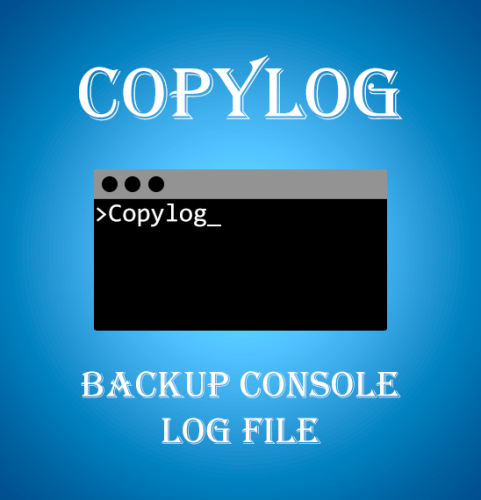Search the Community
Showing results for tags 'backup'.
-
Version 0.3.9
70 downloads
Hey! Here is RustHandler, a script allowing the automatic management of Rust. (Linux Debian based distros : Debian, Ubuntu Desktop & Server (64 bit)) Introducing the NEW RUSTHANDLER CLIENT/SERVER! No, you're not in the wrong place, this is all about hosting a RustDedicated Linux server, and managing it with a simple, pleasant Winform panel, making server management a breeze with just a few clicks. Installation : On the server side: -Put RustHandler.sh in your user's root directory (/home/YourUser/*here), where it must remain for RustHandler to function properly. -Do : chmod +x RustHandler.sh sudo ./RustHandler.sh -install if you're running Debian : chmod +x RustHandler.sh su root ./RustHandler.sh -install And that's it! That's all there is to it! PC side : Now run RustHandler Client.exe on your PC, log in with your normal user (not root). Log in, apply your settings in "Server Settings", save, wipe, update, launch! THAT'S IT. Optional: Install the Rust typography in the archive so that it's correctly interpreted in your software. Don't forget to take a look at the "Rust server running" checkbox, to see if your server is running. In any case, you can't run it twice, or wipe/update while the server is running. The features listed below are obviously still valid, and others will be optimized/added in the future. LEGACY METHODE v0.2.0 : With RustHandler, you can: -Wipe your server in one command, the script will ask you for the seed of the next map, the date of the next wipe, will enter the dates of the wipe you have just done and the one to come in the server description. It will also display the date of the wipe you just did automatically in the title. Are you tired of panicking every time you wipe? -You can change the description and server parameters before wipe in RustHandler.sh, line 33 to 42, just don't touch the variables ({$Variables}), they change the dates automatically. RustHandler.sh therefore, during your next wipe will only ask you for the seed of the desired map and boom! Server wiped! Server will be updated automatically (+Oxide) just after. -NEW: Functionality for full wipe, or wipe while keeping your BP! Just toggle fullwipe or savebp. -NEW: CPU Affinity : If you wish to allocate certain cores, cores range, line 21 : For example "0-3" for your first 4 cores. affinite_cpus=$"0-3" -NEW: Custom Path : Lines 25 and 28, you can now choose custom paths for your server installation, and for the RustHandler folder. Read the description in the script carefully. ServerPath=$"/home/seb/Games/Rust" RustHandlerPath=$"/home/seb/Games/Rust" -You can change, before launching the "wipe" command, the convars (launch commands), and therefore, change the parameters of your server before the next wipe! For example, if in a week, you want your server to go from 4 to 5 players, modify the appropriate line in RustHandler (notepad++, VSCode). Just edit RustHandler.sh before launching. Line 55 to 98 to edit your convars. During your next wipe, the server.cfg will modify itself. You can also prepare the server description of your next wipe beforehand, very useful! server.maxplayers 200 server.hostname "[FR] RUSTinPEACE ! - [DEV] - Wipe '$LastWipe'" server.worldsize 4500 server.globalchat 1 server.secure 1 decay.scale 1 maxteamsize 4 server.saveinterval 600 you have about 40 of the most useful convars. You can add/remove as many as you want. -Disable some plugins at startup, once your wipe is done. And even automatically delete some Data.json files, before restarting the server. Like for example, deleting data from Kits, to start clean during your Wipe. And you can leave these settings in place, the deactivation of plugin and deletion of Data files will only be done when you enter the command "wipe". # Deletes monthly data files. Remove sharp symboles and edit as required : # Will delete ImageLibrary folder with useless cache : rm -rf $HOME/server/oxide/data/ImageLibrary # a Sharp symbole will disable this rules : #rm -rf $HOME/server/oxide/data/Jail #rm -rf $HOME/server/oxide/data/SpawnsDatabase # Will delete useless data files from old wipe : rm $HOME/server/oxide/data/Kits_Data.json rm $HOME/server/oxide/data/Godmode.json rm $HOME/server/oxide/data/SpawnsDatabase/prison2021.json # Deactivates plugins that need to be modified on the new version, or on the new map procgen. Go to Oxide/Plugins to remove the .off from the "Plugin.cs.off" plugin will reactivate it, once you've made your adjustments. mv $HOME/server/oxide/plugins/ZoneManager.cs $HOME/server/oxide/plugins/ZoneManager.cs.off mv $HOME/server/oxide/plugins/MarkerManager.cs $HOME/server/oxide/plugins/MarkerManager.cs.off #mv $HOME/server/oxide/plugins/ZoneManager.cs $HOME/server/oxide/plugins/ZoneManager.cs.off &> /dev/null #mv $HOME/server/oxide/plugins/BotSpawn.cs $HOME/server/oxide/plugins/BotSpawn.cs.off &> /dev/null (Put a "#" Before a line disable deletion, or deactivation.) -Make automated backups of your Rust+Oxide server. Just edit line 104 to 121. You can also configure automatic sending of your backups to FTP/SFTP. For example : # Enable or disable automatic backups, only run when the Rust server is running. enableBackup=true # Enable or disable sending backups by FTP/SFTP. enableRemoteBackup=true # Choose the frequency of automatic backups, in hours. cooldownInHours=6 # Delete backups older than: (in days). deleteOldBakInDays=15 # IP address of your FTP/SFTP server. IP=102.109.223.031 # User of your FTP/SFTP server. user=rustuser # Your FTP/SFTP server password. password=myhoneybirthday # Target directory of your backups on your FTP/SFTP server. pathToSend=/home/BakRust # FTP mod, if you want autobackup to send backups to another machine on Linux, no package allows scripting the sending, so you have to use scp. # If you want to send your saves via scp, just put scp instead of ftp, just below. PS= OVH and other FTP backups are simple FTP, not SFTP. ftpMod=ftp If for example, only local backups interest you, you also have a function above to auto delete backups that are older than 15 days. Local backups will automatically be stored in: /home/YourUser/RustHandler/backup You can change the backup settings at any time, the script will take them in real time, including if the Rust server is running. Simply, if you set previously a save cycle of 6 hours, the parameters will change in 6 hours. -If RustHandler is launched as a root user, it blocks the launch of the server and gives you a warning message (start a server as root is a security breach), and on top of that offers you to install the script's dependencies. It also installs the plugin dependencies: "SignArtist.cs". You will just have to restart your dedicated server afterwards, because Libgdiplus needs it (SignArtist dependency). -RustHandler automatically restarts your server, if for example you use the “TimedExecute.cs” plugin, if you program the command, every day at noon “restart 300”, the server will restart automatically, and if you activate the “Auto_Update” mod, it will update each time it restarts! -RustHandler logs all restarts of your Rust server, whether accidental or not. If for example your server becomes unstable, and you suspect it to restart randomly, consult: /home/YourUser/RustHandler/restarter.log You will have a detailed list of reboots your machine has done. Server restart on 2022-04-07 19:59:05 Server restart on 2022-04-08 12:00:58 Server restart on 2022-04-09 12:01:25 Server restart on 2022-04-10 12:00:54 Server restart on 2022-04-11 12:01:18 Server restart on 2022-04-12 12:00:55 -RustHandler also has a “protection”, which prevents launching a Rust server several times (otherwise data corruption), so in case of error, do not panic, check your running processes, you will see that RustHandler has kick process the old. BUT, RustHandler, will only do this for Rust processes launched ON THIS user, so you can have several Rust servers, on the same dedicated machine, which are completely independent of each other. Magic! RustHandler automatically creates logs (raw logs) of your server, including EVERYTHING, so also the start of the server, which does not normally appear on an RCON protocol. Each time your server restarts, RustHandler creates a new log file. Installation/Use : -Edit the script as required, as explained above (line 21 to 152). -Just drop the script at the root of your User, for example: /home/seb/RustHandler.sh -make RustHandler.sh executable : chmod +x RustHandler.sh -start RustHandler.sh : ./RustHandler.sh RustHandler will create a "server" folder where all your server files will be present: /home/YOURUSER/server As well as a RustHandler folder, where the backups, logs and others will be present I recommend that if you need to modify him afterwards, you do so via the "right-click > EDIT" function on Filezilla, which allows you to modify text files without having to systematically Download > modify > re-upload files. Just remember to make him executable again if necessary. For Linux beginners : Remember NEVER to use root/sudo to modify server files/folders. If you modify files with root/sudo, your normal user will no longer be able to modify them! Upcoming updates: -Unfortunately, I haven't had time to translate everything yet, but it will happen very soon! (Baguette !) Added : English version since 0.0.3 -A Wipe mod (without BP)/ FullWipe : Done : in 0.0.4 version -A presentation in video -A clicable interface throught ssh instead of word commands -Scheduled Wipe -A command or clickable menu to easily import a backup. In case you have a corrupt save. -Your suggestions? Tell me about ! Apologies for the bad english !$25.00 -
Version 1.0.2
60 downloads
Plugin for creating a copy of the console log file. This plugin uses the copylog console command and does not have a settings file. The plugin uses the standard location of the server files. If you use a hosting service, you may need to change the storage paths and file name in the plugin code. For example, if you see that when connecting to the server via FTP, the path to the Oxide folder looks like 127.0.0.1_28015-Server/hostname.com/oxide/, then in the plugin code, the file paths should look like this: string logFilePath = @"Server/hostname.com/console.log"; string currentTime = DateTime.Now.ToString("dd.MM.yyyy - hh'h 'mm'm 'ss's'"); string destinationDirectory = Path.Combine("Server", "hostname.com", "oxide", "logs", "Console_log"); string destinationPath = Path.Combine(destinationDirectory, $"console_{currentTime}.log"); string logFilePath = @"Server/hostname.com/console.log"; - This is the path to the console log file on your server. Be careful, the name of the file may differ from console.log if it is changed by the settings on the hosting that you use. string destinationDirectory = Path.Combine("Server", "hostname.com", "oxide", "logs", "Console_log"); - This is the destination path for saving copies of your log file. To automatically save copies of the log file, you can use the XRestartUI or Timed Execute plugins. In XRestartUI: "Configuring scheduled restarts [ Any command can be scheduled at any time ]": { "06:00": "copylog", "18:00": "copylog" } In Timed Execute: "RealTime-Timer": { "06:00:00": "copylog", "18:00:00": "copylog"Free





